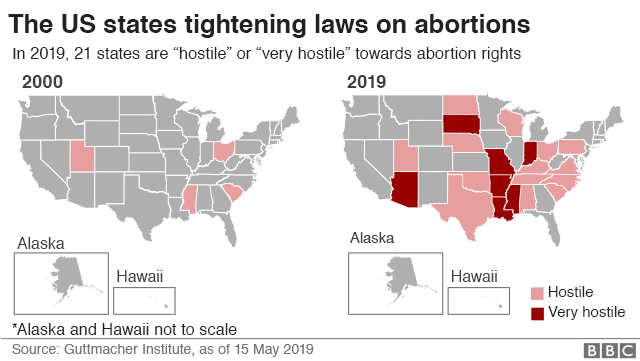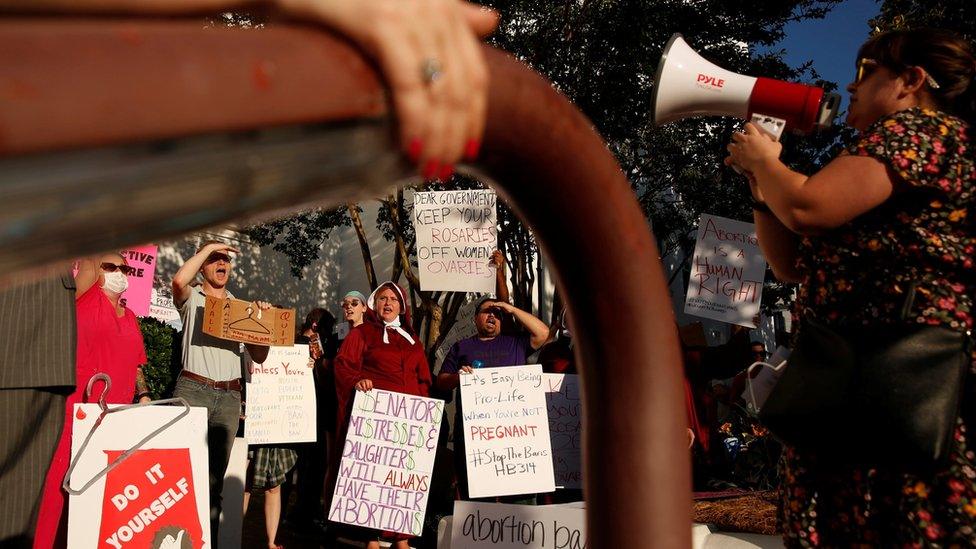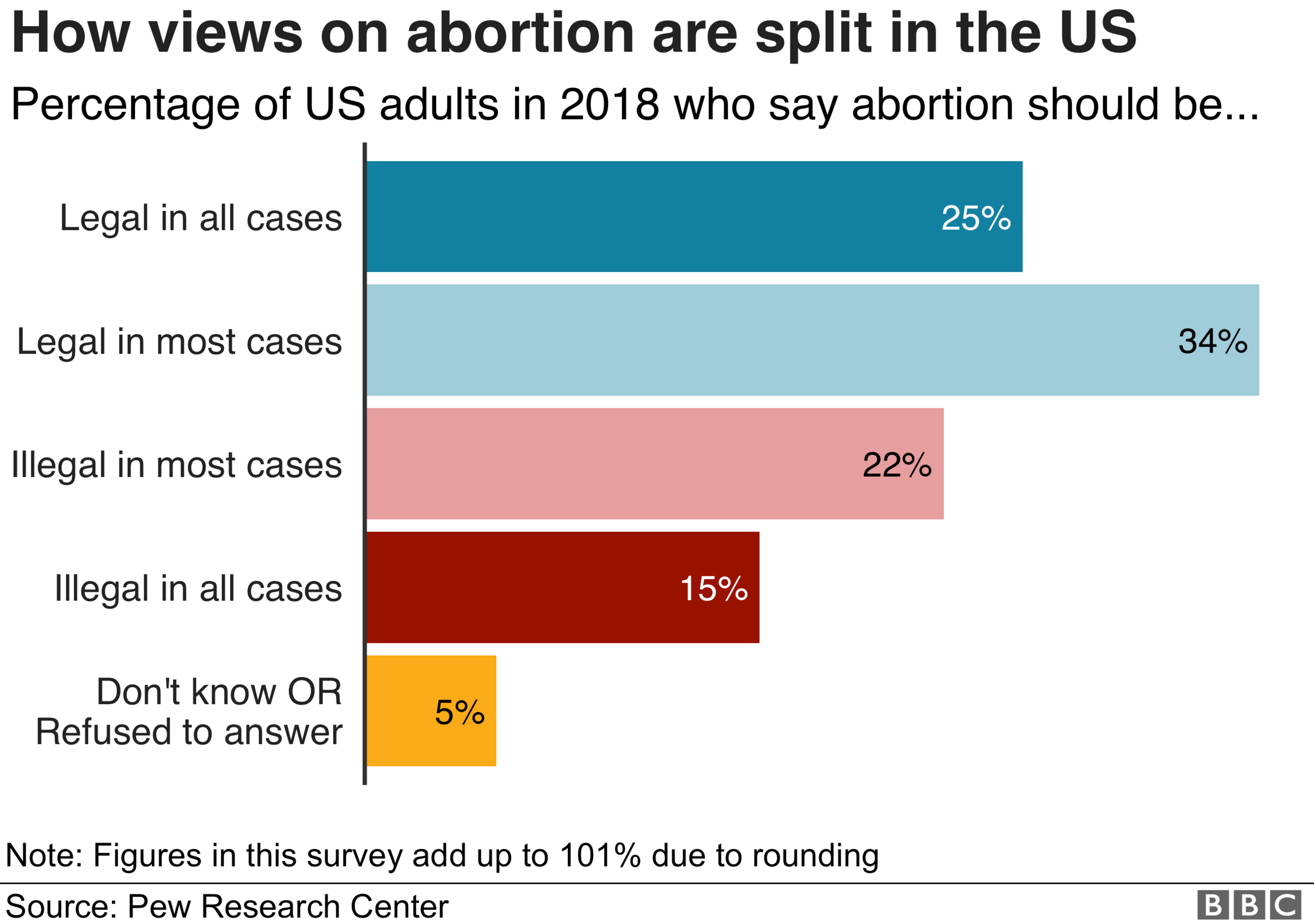Alabama passes bill banning abortion
- Published
The new law in Alabama makes abortion illegal in almost all cases
Alabama has become the latest US state to move to restrict abortions by passing a bill to outlaw the procedure in almost all cases.
The law includes a ban on abortion in cases of rape or incest.
Supporters say they expect the law to be blocked in court but hope that the appeals process will bring it before the Supreme Court.
They want the court, which now has a conservative majority, to overturn the 1973 ruling legalising abortion.
Alabama's 35-seat Senate is dominated by men, and none of its four female senators backed the ban. It was then signed by Alabama's Republican governor, Kay Ivey.
Sixteen other states are seeking to impose new restrictions on abortion.
Earlier this year the Supreme Court blocked implementation of new abortion restrictions in Louisiana. However the ruling was made by a narrow margin and the case is due to be reviewed later this year.
Why is this happening now?
The bill's architects expect that it will be defeated in the lower courts, but hope that it will therefore eventually come before the Supreme Court.
They have been emboldened by the addition of two conservative justices nominated by President Donald Trump, Neil Gorsuch and Brett Kavanaugh, who give the nine-member court a conservative majority.
Their aim, they say, is for the landmark 1973 Roe v Wade ruling to be undermined or overturned completely.

Alabama's Lieutenant Governor Will Ainsworth said: "Roe must be challenged, and I am proud that Alabama is leading the way."
Eric Johnston, who founded the Alabama Pro-Life Coalition that helped draft the bill, told NPR: "The dynamic has changed.
"The judges have changed, a lot of changes over that time, and so I think we're at the point where we need to take a bigger and a bolder step."
What is in the Alabama bill?
Under the bill, doctors face 10 years in prison for attempting to terminate a pregnancy and 99 years for carrying out the procedure.
A woman who has an abortion would not be held criminally liable, and abortion in cases where the mother's life is at serious risk are allowed.
The state Senate approved the law by 25 votes to six, rejecting exemptions for cases of rape or incest, with some noting all those voting for the bill were men.
Allow X content?
This article contains content provided by X. We ask for your permission before anything is loaded, as they may be using cookies and other technologies. You may want to read X’s cookie policy, external and privacy policy, external before accepting. To view this content choose ‘accept and continue’.


'Why are we here again?"
by Ritu Prasad, BBC News, Alabama
Democrats here in Alabama knew they had no chance of stopping this controversial bill, but that only seemed to make the debate on the senate floor even more heated. Activists packed the senate gallery to watch the drama play out - reacting with laughter and gasps in turn.
The few women who spoke on the floor were quick to highlight a key fact: this decision about women's bodies was being made almost entirely by men.
As one female lawmaker introduced a sure-to-fail amendment to the bill to make it illegal for men to get vasectomies, the gallery and overflow watch room upstairs burst into laughter.

Pro-choice protesters gathered outside the senate building
On the senate floor, when the amendment failed, the lawmaker made her point, saying: We have never policed men's bodies the way we do women's.
Just outside the stark white walls of the state legislature were still more pro-choice advocates, raising signs that called for women's equality, for protecting Planned Parenthood, for men to stay out of women's rights issues.
One exasperated young woman told me: "We've already had this vote about women before. In the 70s. Why are we here again now?"

What restrictions are other states enacting?
Earlier this year the governors of four states - Georgia, Kentucky, Mississippi and Ohio - signed bills banning abortion if an embryonic heartbeat can be detected.
Opponents say this amounts to a ban on abortion because cardiac activity in an embryo can be detected as early as the sixth week, before a woman may be aware that she is pregnant.

You may also be interested in:

The Guttmacher Institute, which campaigns for reproductive rights, says none of these bans are yet in effect, but their introduction is part of the same strategy to get the cases heard by the Supreme Court, it says.
Overall 28 states are currently considering legislation that would ban abortion in a variety of ways, it says.
What reaction has there been?
"Abortion is not OK" - Women in Alabama react to the bill
Dr Yashica Robinson, who is one of the few doctors left providing abortion in Alabama, told BBC Radio Four's PM programme that she would continue to do her job while fighting for women's access to abortion in the state.
"I will still be here taking care of women and doing the things I can legally do," she said. "Then, I will be helping women to the places they need to be in order to get the healthcare that they desire or need if they are going to make it difficult here."
Alabama Democratic state Senator Bobby Singleton said the bill "criminalises doctors" and was an attempt by men "to tell women what to do with their bodies".
Several Democratic presidential hopefuls also reacted on social media, including Kamala Harris.
Allow X content?
This article contains content provided by X. We ask for your permission before anything is loaded, as they may be using cookies and other technologies. You may want to read X’s cookie policy, external and privacy policy, external before accepting. To view this content choose ‘accept and continue’.

The National Organization for Women called the ban "unconstitutional" and said it was "a transparent effort to drum up political support for anti-abortion candidates in upcoming elections".
Staci Fox of Planned Parenthood Southeast Advocates called the decision "a dark day for women in Alabama and across this country".

In a statement she said Alabama politicians would "forever live in infamy for this vote and we will make sure that every woman knows who to hold accountable".
What is access to abortion like in the US?
There are currently three abortion clinics in Alabama, down from more than 20 in the 1990s, according to pro-choice campaigners.
Other states have seen similar falls in the number of abortion clinics and in 2017, six states reportedly had just one abortion clinic in operation.
However states with liberal majorities are seeking safeguards to the right to abortion in their own constitutions.
- Published8 February 2019
- Published28 October 2018
